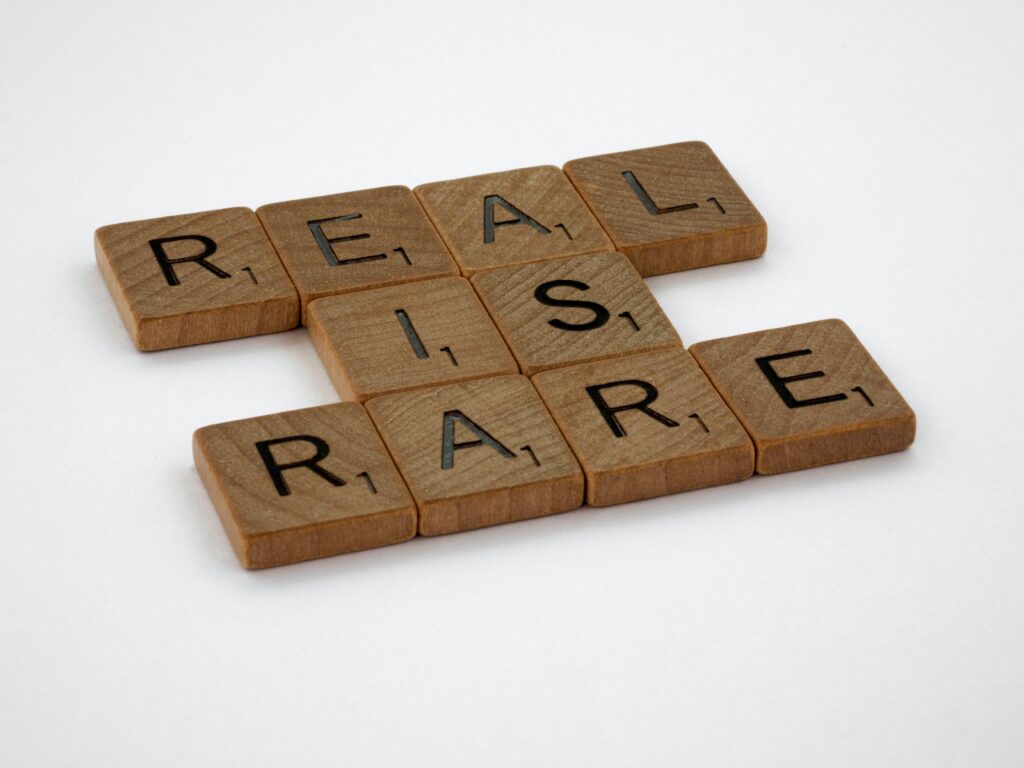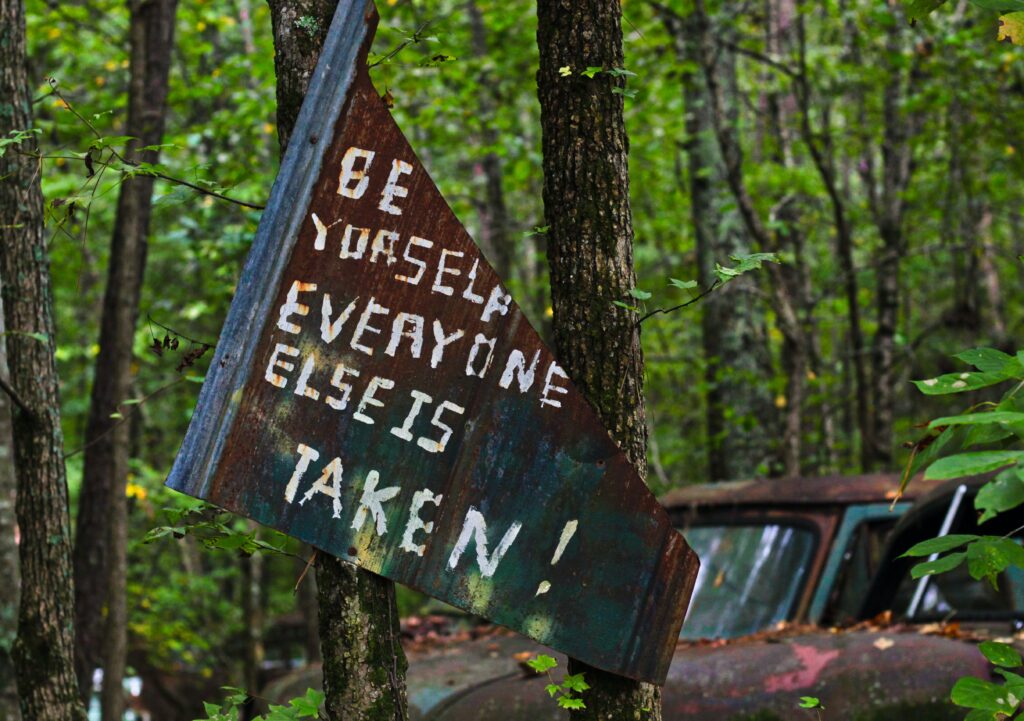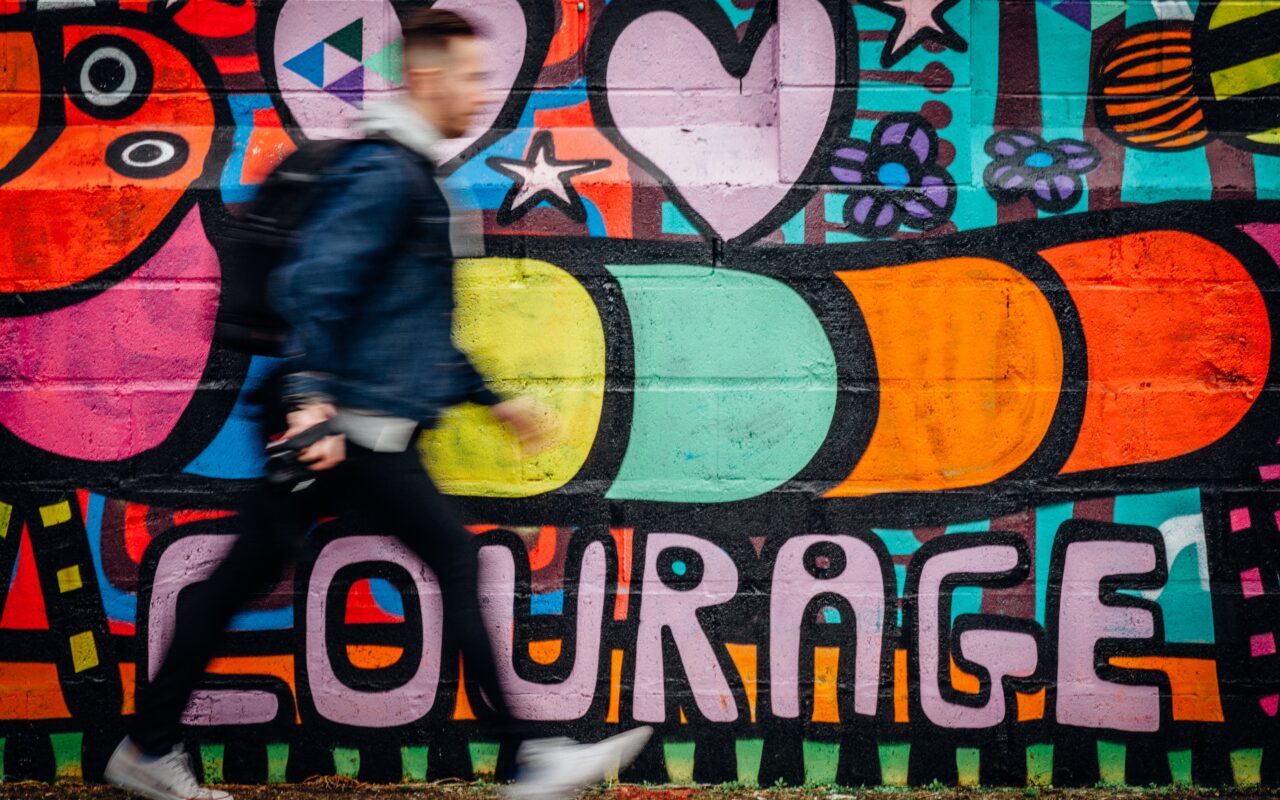Have you ever found yourself avoiding the hard stuff, or not being authentic, in order to avoid a problem? If you have, you’re not alone. But although we’ve avoided the problem, we haven’t solved it, and we know it will surface again.
Courage enables us to face the unknown and the difficult. Courage isn’t just for heroes. It’s available to all of us. If we want to be courageous, we can start by being authentic. After that, the rest is easy.
Psychology Today reports that 85% of people suffer from low self-esteem. That’s 5 people in 6! That issue with low self-esteem lies at the heart of the challenge with courage.

I was brought up to worry about what other people thought of me. We were all pretty conflict and risk averse in my family. So I tried to please everyone else, and in that vacuum of not knowing or communicating what I wanted, quite often ended up doing things that other people wanted me to do. I wasn’t being my authentic self and having the courage to speak from my heart about challenges or priorities. That resulted in the classic ‘too many priorities’ problem, and the inevitable need to work way too hard and still having to let people down at work and home.
Deep down inside I knew I was not being my authentic self. I didn’t feel like I was bringing everything I had. I wasn’t really pursuing my purpose or bringing my skills to bear on what was most important. But then … I didn’t really know anyone else who was either.
No one really talked about any of this. In fact, everyone seemed pretty happy with me. Bosses, senior stakeholders, colleagues, friends, family too. I was moving along quite comfortably. Pretty successful but not setting the world on fire. My lack of authenticity did nag away at me on the inside, but it didn’t seem to create any massive problems.
Breaking through
Then everything changed in an instant. As a result of a family tragedy, I ended up effectively a single parent of 3 school-aged children and a carer for my beautiful fit 46 year-old wife who had suffered brain damage as a result of a heart attack that left her on life support for 10 days and in hospital for 10 weeks. In those first few days no one knew if she would even survive. It was only the machines that were keeping her alive. All the safety and security that I thought my life was built upon was ripped away in an instant. All of a sudden, I was trying to navigate the greatest uncertainty I’d ever faced with no control over the outcome whatsoever. The most important thing to ever happen to my family and I, and I had no influence … none at all. How was I going to get her through this? How could I help the kids through this, let alone myself?

This was the worst thing I’ve ever had to face. But it wasn’t 100% bad. Some good has come from it. That extreme situation completely blasted away any worries I had about looking bad, or making mistakes or even living up to other peoples’ expectations. I had to learn to ask for help, and say no to just about everything. I had to let go of expectations about the present, the future and people who were dear to me. Put simply, I had no time or ability to be anything other than authentic.
Benefits of being authentic
As I became more authentic, I changed the way I behaved at work, and the way I lead my team. I was authentic at work as well. I had discovered purpose and compassion.
It didn’t mean I blurted out everything all the time. I was still respectful. But above all I was authentic. I was honest about what I could and couldn’t do. I didn’t over-commit anymore. Purpose was at the fore of everything I did, and also, what we did as a team. I was playing full out and really throwing myself into whatever I was doing.
Taking risks became possible. In fact, they became more important. If we were going to innovate and improve, we had no other choice. I’ll be honest, with everything else in my life, I was working fewer hours at work than before. But the irony was, I was getting more done. Especially the important stuff. My team were performing amazingly. I shared what was going on in my life with them. They stepped up. They supported me. I was doing things I’d never done before, and so were they.

My 1:1 conversations with colleagues and friends went to a new level of honesty and importance. I didn’t hold back if there was an issue that needed to be dealt with. But I did it with compassion – from a genuine desire to help. Then they started sharing too. I was able to help them too. So many of them have grown so much since then. They’re much more authentic, courageous, and successful as a result. I’m so proud to know them.
It took me a while to realise it, but that authenticity that we had made us all more courageous than before. Most importantly, the courage to be ourselves. The scary stuff wasn’t always as scary as before. But even when it was still scary, we supported each other through it. We were able to operate outside of our comfort zones a lot more often than before. We had created psychological safety for ourselves.
But the main benefit of being authentic is for ourselves. Acting in congruence with our beliefs is extremely fulfilling. In fact, it is liberating. I was able to be myself, and I didn’t have to hide or suppress what I believed. I was being congruent with my values.
When I reflect on all of this, I wonder why hadn’t anyone told me about this before? Surely other people had stumbled on this? I mean, this was awesome, life-changing stuff. I had spent 46 years worrying about stuff that wasn’t even real!
What is authenticity?

The expert in authenticity and courage, Brene Brown, describes it as:
“the daily practice of letting go of who we think we’re supposed to be and embracing who we are.”
While we’re at it, let’s look at Brene’s definition of courage:
“To speak one’s mind by telling all one’s heart.”
This is about heart – acting with honesty and integrity.
Your team can smell it a mile off when you’re not acting authentically. The easy stuff is easy. This is about the hard stuff. As a leader, you need to face into the uncomfortable and awkward situations. That’s what the team needs from you. The growth lies there. That’s where you earn their trust and loyalty. Do that, and they’ll follow you anywhere.
Once you’ve got your authenticity sorted out, courage will follow shortly after. After all, courage comes from the heart. Literally. It is based on the latin word ‘cor’ for heart, which then became ‘couer’ in French, and hence courage in both French and English.
These days this is rarely the Braveheart kind of courage where we charge into battle in the face of seemingly impossible odds. This is more like being the first person to speak up or being prepared to challenge the view of the team or the boss’ recommendation. Or it could be giving people the development feedback that you know will be tough to hear. Then there’s the one that people fear more than death … public speaking.
How to be authentic and courageous

Can you learn to be courageous? Absolutely.
How? We learn it the same way we learn everything else. First we learn the theory and a few tools. Then we need to practice them. A lot. Until we’re good at them. This involves not being very good at it for a while. The trick is to keep going. If we want to progress more quickly, we’ll probably need some help from a coach or mentor. The big thing that separates people is whether they’re prepared to face down their fear of doing what it takes for long enough to get good at it.
I have a simple 3 step model for how to learn authenticity and courage – 3 C’s:
- Care – Find something that means enough to you to be prepared to be yourself to pursue. Your glorious, flawed self. Something you care enough about to fail at it.
- Continue – Then release your hand brake and pursue it. We succeed through temporary incompetence, not through magic.
- Compassion – Be compassionate to yourself and others – create the safety for yourself to try, fail and try again
Start with number 1 and go from there. Start nice and small and then build it up.
Being authentic and courageous won’t happen overnight. It is something we build up over time. The more we do it, the better we get. There’s magic in there for us along the way. Just making the first attempt is amazing. It is petrifying too, but once we’ve done it, the sense of pride (and relief) is something we just don’t forget. And it is something we will want to do again … and again.
If you’d like some help with authenticity, courage or just progressing faster, reach out to me here.
Remember, whatever you do, do it with heart!

Comments are closed.